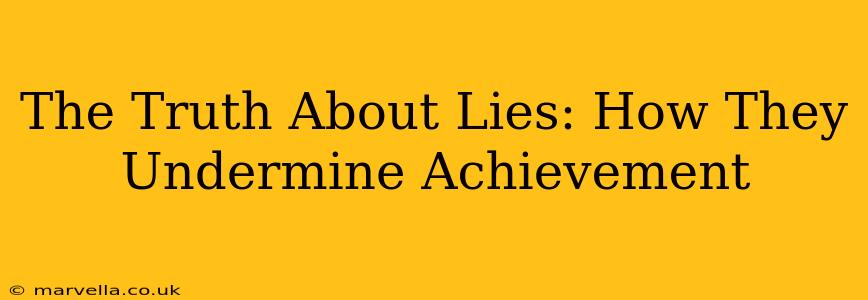We all tell lies, some small, some significant. But the impact of dishonesty, even in seemingly minor instances, can significantly hinder personal and professional achievement. This isn't just about grand deceptions; it's about the insidious ways even small falsehoods erode trust, damage relationships, and ultimately, prevent us from reaching our full potential. This article delves into the detrimental effects of dishonesty and explores strategies for cultivating greater honesty and integrity in our lives.
How Do Lies Affect Our Achievement?
Dishonesty creates a ripple effect, impacting various aspects of our lives. The immediate consequences are often relatively minor, but the long-term effects can be devastating. Lies erode trust, the cornerstone of any successful relationship, whether personal or professional. When trust is broken, it’s difficult, if not impossible, to rebuild. This breakdown of trust hinders collaboration, prevents open communication, and ultimately stifles progress toward goals.
What Are the Different Types of Lies That Impact Success?
Lies aren't always blatant fabrications. They can manifest in subtle forms, each with its own destructive potential:
- Omissions: Withholding crucial information is a form of lying. This can be as simple as failing to mention a crucial detail in a work presentation or omitting a negative aspect of a project during a job interview.
- Exaggerations: Inflating accomplishments or skills can create a false impression, setting unrealistic expectations. This can lead to disappointment and damage your credibility when the truth eventually surfaces.
- White Lies: These seemingly harmless fibs, while intended to be kind or avoid conflict, can create a pattern of dishonesty that erodes trust over time. The accumulation of these smaller untruths can chip away at the foundation of honesty.
What Happens When You’re Caught in a Lie?
Being caught in a lie, regardless of size, carries significant consequences. It damages your reputation, erodes trust, and can even lead to legal or professional repercussions. The resulting damage to your credibility can significantly hinder future opportunities. It can be far more difficult to regain trust once it's been lost.
Can you recover from being caught in a lie?
Yes, it's possible to recover from being caught in a lie, but it requires sincere effort and a genuine commitment to change. Acknowledging your mistake, taking responsibility for your actions, and actively working to rebuild trust are crucial steps in the recovery process. This involves being transparent and honest in future interactions, demonstrating consistent integrity, and actively repairing any damaged relationships.
How Can I Be More Honest and Improve My Integrity?
Cultivating honesty and integrity requires conscious effort and self-reflection. Here are some practical strategies:
- Self-awareness: Identify your patterns of dishonesty. Are you prone to exaggerations? Do you tend to omit information? Recognizing these patterns is the first step toward change.
- Mindfulness: Practice being present and truthful in your interactions. Before speaking, consider the accuracy and impact of your words.
- Accountability: Share your commitment to honesty with trusted friends, family members, or mentors. Having someone hold you accountable can provide valuable support and encouragement.
- Seek Feedback: Ask for honest feedback from others regarding your communication style. Their perspective can highlight blind spots and areas for improvement.
- Practice Empathy: Consider how your words and actions might impact others. Empathy fosters a greater awareness of the consequences of dishonesty.
The Long-Term Benefits of Honesty
The rewards of honesty are far-reaching. Building a reputation for integrity leads to stronger relationships, increased trust, and greater opportunities. Honesty fosters a sense of self-respect and reduces the stress and anxiety associated with maintaining a facade of deception. Ultimately, honesty paves the way for greater personal and professional success.
In conclusion, the truth about lies is that they are detrimental to achievement. While the temptation to lie may seem appealing in the short-term, the long-term consequences far outweigh any perceived benefits. By cultivating honesty and integrity, we build a foundation of trust, fostering stronger relationships and opening doors to greater success. The journey toward greater honesty is a continuous process, but the rewards are immeasurable.

